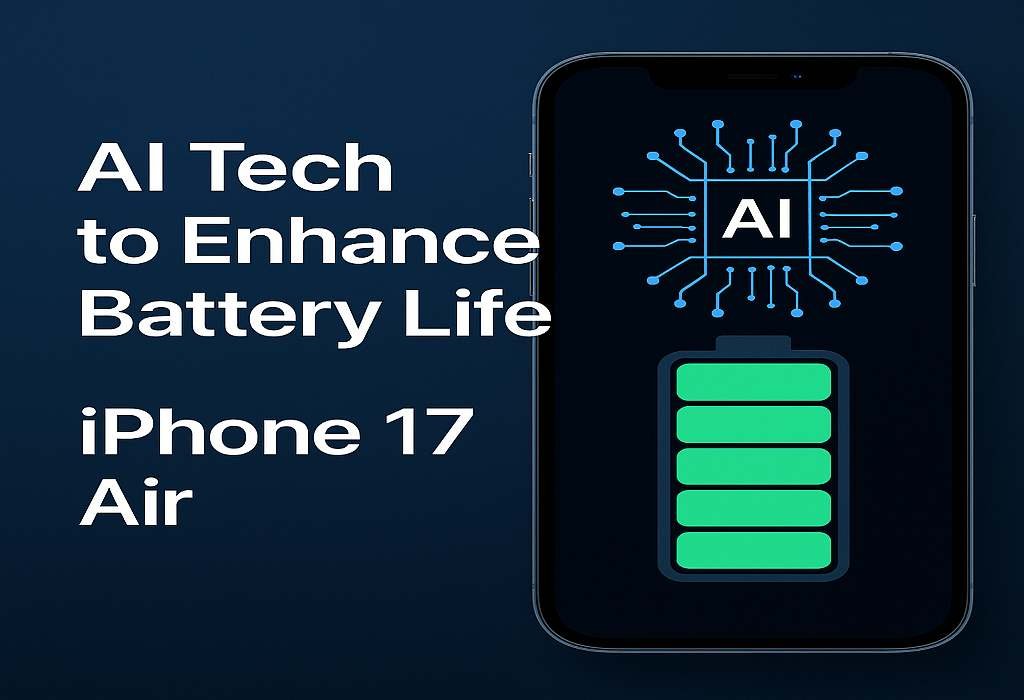AI-optimized battery management is one of the most hyped features as Apple is going to release the iPhone 17 series, not a camera, screen, or CPU. With the help of the next-generation on-device AI engine, the iPhone 17 Air will probably possess smart battery features in the fall of 2025. The creation will be a big turning point on the way iPhones consume power and life, combining human habits and machine learning to optimize efficiency.
Take a closer look at how Apple is using artificial intelligence to advance batteries performance-and what it may entail for users.
A Smarter Battery for a Smarter Phone
The lifespan of the battery has been a thorn in the flesh of smart phone users. Although Apple has steadily increased battery chemistry and power-efficient chip performance, the next iPhone 17 Air models employ a different strategy: on-device AI-powered predictive, adaptive energy management.
The iPhone 17 Air will learned how you use your phone and when you use it, as opposed to using theStatic battery-saving modes, machine learning models will be utilized. In real time the system will then intelligently optimize charging cycles, background activity, screen brightness and app refresh rates to save power.
It is not merely a question of stretching out battery life on a day to day basis but also extending the life and health of the battery as a product.
How AI Battery Optimization Works
The AI battery management of the iPhone 17 Air is based on a new Apple A19 Bionic chip with an improved Neural Engine that can perform over 25 trillion operations per second. This enables the phone with the capability to analyze the behavior of the user and the environmental factors in real time.
The system might work like this:
Usage Pattern Recognition: The AI will notice when you normally charge your phone, how frequent you use power intensive apps, and at what time of the day you are the most active.
Smart Charging Scheduling: When you charge at night, the phone may postpone the full charge to 100% until right before you wake up, which helps decrease battery damage.
Adaptive Performance Scaling: Sometimes the AI can slow down background activities or limit animations or reduce refresh rates even without your input, in case it notices you are on battery power and may not get a chance to recharge.
Place and Connection Awareness: AI can learn when high-power requirements are likely (such as entering a low signal strength area, or intend to stream video) and can allocate system resources appropriately.
This change in power management philosophy, with the help of artificial intelligence, can be considered a milestone on the way to more intelligent, more self-sufficient smartphones.
Built on Apple’s Privacy-First AI
Privacy has been defined as one of the most significant features of this new technology. Apple AI systems will be completely on-device, unlike some Android-based solutions, which are highly cloud-processed, will not transfer any of your usage data outside of your phone.
Such a design follows Apple traditions of determining privacy and ensures that AI battery optimization is effective and safe. iPhone 17 Air will be able to learn your habits without you having to send them to Apple or other third-party services.
Battery Health Benefits Over Time
Besides day-to-day power conservation, the AI system on the iPhone 17 Air is also meant to protect battery health during several years of use. The system will be able to minimize degradation, which is one of the greatest long-term inconveniences in the ownership of smartphones through the analysis of temperature, charging patterns, and load cycles.
This advance battery care is a lot. A considerable number of iPhone users start experiencing battery degradation at the 18-24 months mark. And as far as AI can make that process slower, the iPhone 17 Air might be able to provide a superior experience throughout its entire lifecycle, preventing the need to replace the phone due to a dead battery or forced upgrades.
What It Means for Users
So what does this all mean in practical terms?
More battery life when you want it – Less opportunity to pick up the charger at 4 PM.
Longer lasting batteries – Less capacity losses after one year of intensive use.
No switching off and on – No more searching in settings to activate the Low Power Mode.
Smoother, personalised performance- AI adjusts in the background to make the phone fit your routine.
Analysts and those who have early tested the game anticipate these improvements to be minor, yet noticeable. Instead of an extreme battery improvement after the first day, the gains will be more apparent after weeks and months of usage.
Part of a Larger AI Push
The AI battery system is not the only part of Apple venturing into device-level intelligence. Other smart features that will supposedly be incorporated in the iPhone 17 Air will be:
AI photo and video enhancements
Smarter Siri interactions
Predictive text and keyboard AI
Real-time language translation
All these are being optimized to execute on-device, without internet connection required, which is why the iPhone 17 Air will play a central role in the on-device AI revolution.
Final Thoughts
iPhone 17 Air is not only about the faster chip or more sleek design, but about making a device that thinks smarter on your behalf. AI battery management is a significant innovation that Apple is bringing to make everyday life better in silent yet effective ways.
This is good news to users who are exhausted with micromanaging settings in a bid to eke out additional battery life. With the introduction of the AI capabilities in the iPhone 17 Air, Apple is saying not only that this new smartphone will have greater stamina, but that it will be smarter, more long-lasting and more user-centric. Not merely all day, but all year round, and more.
